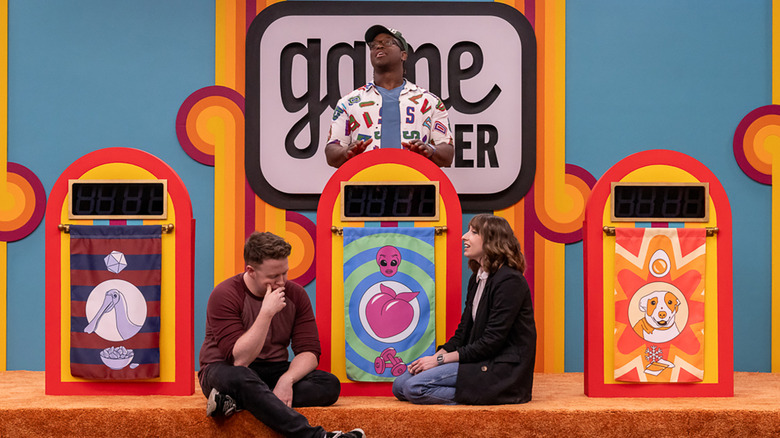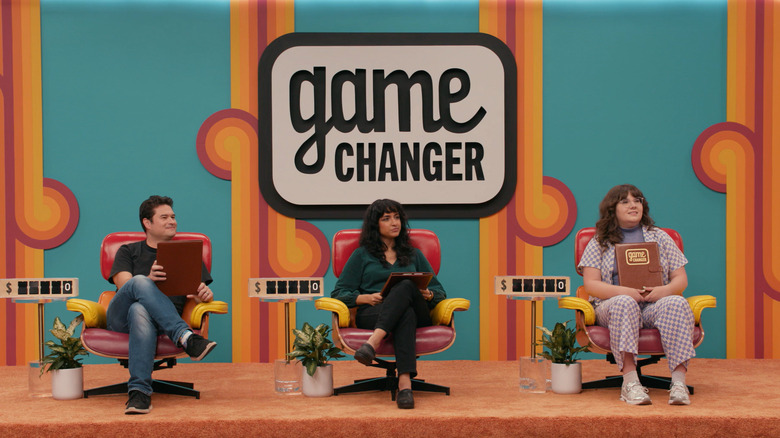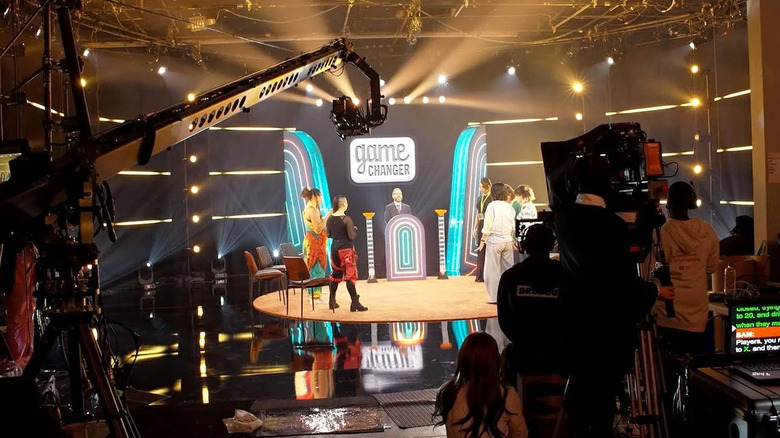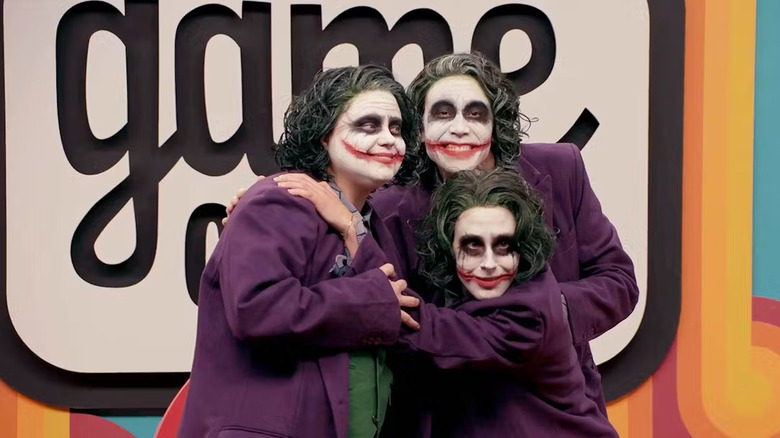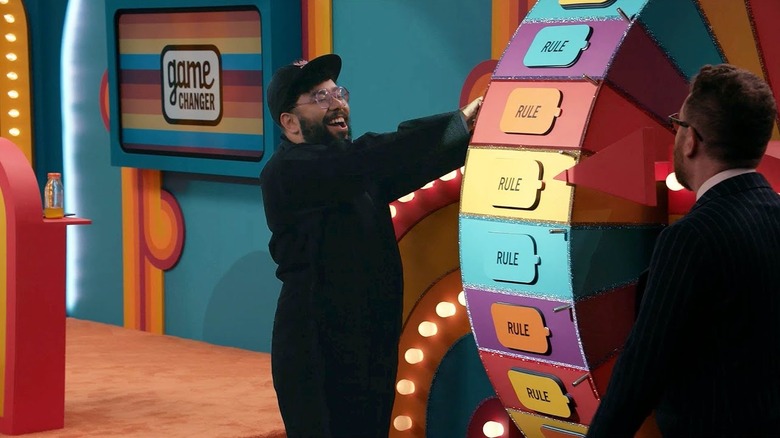The Best Comedy Series On Streaming Is A Masterclass In Low-Budget Filmmaking
Before television became the cultural juggernaut it is today, game shows — especially quiz shows — were one of the fastest ways to earn a bump in ratings. Exclusive sponsors would foot the bill on the production of the show in exchange for advertising, and executives did all they could to keep the brands happy. So naturally, producers started rigging the games and manipulating the outcomes to boost viewership numbers. Enter: The Quiz Show Scandals of the 1950s, when audiences found out the results of shows like "Twenty-One" and "The $64,000 Question" were pre-determined. The scandals completely changed the landscape of television. Advertisers no longer sponsored shows and instead purchased on-air time during the show in short bursts between segments, speedrunning the practice of commercial breaks, which was in its infancy.
In the wake of the scandal, game shows had to earn back trust. Prize money got slashed, sets got humbler, and contestants looked like they wandered in from the DMV, but what emerged was ingenuity, and shows like "Jeopardy!," "The Price Is Right," "Family Feud," "Password," "Wheel of Fortune," and what became "Press Your Luck" are still airing today. These shows thrived not because they were flashy, but because they were charming and they held the promise that anything could happen — and it often did. Back then, sets looked like they were cobbled together with leftover materials from whatever studio production just wrapped, and the contestants' behavior was truly unpredictable. Now, modern primetime game shows are techno-dystopian colosseums with LED wall screens and are overproduced within an inch of their lives. As Den of Geek rightfully pointed out, they all look like the interiors of spaceships. The shift from cozy to cosmic isn't accidental because they're no longer just shows — they're content. And content must be big, shiny, and bingeable.
Still, amid all the spectacle, there's one exception: "Game Changer" on the best streaming service out there, Dropout. It's clever, chaotic, filmed in a modest studio, and it's arguably the best game show on TV. "Game Changer" is proof that creative ideas and interesting people still reign supreme, even without a multi-million-dollar budget per episode.
It's time for a Game Changer!
At first glance, "Game Changer" looks like a traditional game show. Contestants show up and typically stand behind a podium, Dropout CEO Sam Reich takes his rightful position as the host, and each episode sees the players competing for points that determine a winner, celebrated with a downpour of confetti. Alas, only the benevolent trickster god knows the rules of the game. The players have no idea what they've gotten themselves into, and the parameters of the episode are only made evident as they go along. Or, as Sam says:
"The only way to learn is by playing, the only way to win is by learning, and the only way to begin is by beginning."
Sometimes that means spontaneously playing a drinking game version of "The Traitors," showing up to learn that you've been unwittingly set up on your own version of "The Bachelor," completing stressful tasks without elevating your heart rate, escaping the Green Room that has been converted into an Escape Room, engaging in some good ol' fashioned Simon Says (Sam Says, of course), or even playing a less-violent version of the plot of "Cheap Thrills." Since the launch of "Game Changer," four episodes have led to spin-off shows: "Dirty Laundry," where participants try to guess "Never Have I Ever"-style secrets of other players; "Make Some Noise," the popular (and endlessly memeable) improv comedy series that many have described as the evolutionary next step after "Whose Line Is It Anyway?"; the improvisational musical show "Play it By Ear"; and the upcoming competitive crowd work series "Crowd Control," due out later in 2025.
The allure of mystery is the magic formula that makes "Game Changer" work as well as it does, weaponizing the comedy of confusion and turning game design into a spontaneous narrative arc. Regardless of the actual game at hand, each episode becomes part logic puzzle, part psychological suspense, and part performance art, all culminating in laugh-out-loud moments and often edge-of-your-seat thrills. And it succeeds season after season, without needing to turn the soundstage into an LED hellscape, ship competitors off to mansions in tropical getaways, or otherwise flaunt the type of production wealth the intersection of art and commerce now requires of anything under the "entertainment" umbrella.
The power of coincidence as collaborator
One of the things that first attracted me to Dropout (and back in the day, CollegeHumor, from which Dropout evolved) was the accessibility. And I don't mean that in a sense of ease watching it on YouTube or as a designated streaming platform, but that the art being made and the comedy being produced is accessible to our own reality. With "Game Changer," especially, we know human beings are involved every step of the process. When Ash Kron comes out with a prop or the camera shows video village, we see with our eyes people who make the show possible, and this is in such opposition to every other game show on the market, where the goal is very much to never see the man behind the curtain, so to speak. For Sam Reich, this is exactly the point:
"To be very pretentious — because I love this question and it activates all sorts of my art molecules — when James Joyce was dictating 'Finnegan's Wake' to Samuel Beckett, someone knocked at the door and James Joyce said,' "Come in.' The words 'come in' made their way into 'Finnegan's Wake,' and Samuel Beckett asked James Joyce if he wanted to delete them. James Joyce's response was, 'No, coincidence as collaborator,' which is to say we show the seams of production, or we started to show the seams of production in 'Game Changer' because there's no way around it."
Hiding the low ceilings — or the camera crew, should a player roam off set — would take considerable effort. Instead of pretending otherwise, "Game Changer" leans into its limitations. Off-camera laughter only sharpens the punchlines, and in an era where creatives are fighting tooth and nail to maintain their livelihoods, there's something deeply reassuring about seeing on-screen talent call out camera operators, makeup artists, stylists, prop masters, and countless other crew members by name, whenever the moment calls for it. "We like to brag about the hard work that everyone is doing behind the scenes," Reich tells me. Between episodes, Dropout releases minisodes offering a behind-the-scenes peek at how each episode came together.
"For me, showing the seams of production is a part of what makes 'Game Changer' interesting from a meta perspective — if this stuff weren't authentic, it wouldn't be nearly as interesting [...] What I could have never anticipated is that in the world we're now living in, which is the world of TV that costs $10-25 million an episode and AI, that people would feel starved for authenticity." He continues, "I do think our content is an answer to that, even though I think where it comes from is a non-commercial place of just enjoying authenticity."
Sam Reich is one-half host, one-half audience
As the host, it may seem like Reich is at an advantage, considering he knows what each game is going to be while the players do not, but this means he's tasked with hosting a show where the players' performances are completely unpredictable. "What makes 'Game Changer' so fun to produce for me is that I'm one part host and one part audience," Reich explains. "Anyone who's a fan of the show can watch me pivot between those two modes where I have a game show host character that I'm playing, and then I burst out laughing 'cause I never could have predicted how my players are going to respond."
For an example in season 7, check out the episode "Rulette," where players Oscar Montoya, Anna Garcia, and Jeremy Culhane spun a giant wheel that gave them rules to follow for the rest of the game, like "doing your best Christopher Walken" or "wearing a huge cowboy hat." This meant that the game was completely up to chance, and the end result (which I will not spoil) was comedy gold.
"There aren't hard and fast rules to what can and can't be a 'Game Changer' episode, but if you look at a lot of other episodes as we've written prompt after prompt, we have a sense of the flow of the episode," clarifies Reich. "Here, the flow of the episode was relegated to a wheel, was relegated to chance. Sometimes I try to think of episodes as sort of ideally act one, act two, act three. I knew in the back of my head with Rulette that in an ideal world, they would break the game in the last act, but I couldn't count on it."
Reich also got a little taste of his own medicine when the players of "One Year Later" — an episode where Vic Michaelis, Jacob Wysocki, and Lou Wilson were given an entire year to complete tasks — colluded with his wife (the brilliant Elaine Carroll) to put hidden cameras around their home and later forced Sam into a one-hour session with a kink therapist to talk about the root of his "control issues." It's the sort of thing that just could not happen on a mainstream game show, because the success of "Game Changer" and Dropout as a whole can only exist with collaborative trust — including from Reich.
The Game Changer audience doubles as the show's marketing
Where Dropout has consistently outpaced its colleagues and competitors is in its innate ability to tap into the social media machine and utilize it to the company's advantage. Reich has never shied away from the fact that they use snippets from episodes to expand their viewership, and pushed that to the extreme with the recent episode "Fool's Gold." In it, players Mike Trapp, Rekha Shankar, and Jordan Myrick are given $10,000 to invest in viral video pitches from their fellow Dropout castmates. The videos will all be produced and released across the Game Changer social media platforms, and by the end of the month, whoever invested in the most-watched video wins. It's "Shark Tank," but instead of financially backing the Scrub Daddy, it's an ASMR video of Paul Robalino covering his entire body in craft glue to peel it off like human snake skin.
Conceptually, this is a layered master stroke. On the surface, it's a frenetic way to embrace the comedic instincts of the cast, but it's also free market research. Videos like Jordan Myrick successfully taste testing which breast milk belongs to which of their friends, Persephone Valentine's sexy car wash, or former NFL player Johnny Stanton's "Human Puppy Bowl" (where football players dress like puppies and play football) are doing banger numbers on platforms that allow raunchier content, but is getting throttled into suppression on a platform like YouTube, where family-friendly content is prioritized. Anything related to "Dimension 20" or Brennan Lee Mulligan were immediate front-runners, with Google even adding an interactive in-joke when you Google "Brennan Lee Mulligan" to reference his fake "I'm leaving Dropout to make American Girl Doll Shoes" video to keep the joke alive.
The episode is a fun way for the fandom to feel involved with the outcome of the show, but it's also the fastest way for the company to know what sort of clips will perform the best on which platforms and adjust their marketing strategy accordingly. Sure beats investing millions into out-of-touch "consultants" who are just gonna say, "Put Charli D'Amelio on this season," only to learn casting TikTok influencers doesn't correlate to increased viewership outside of TikTok.
Game Changer continues to evolve the format
Unlike most game shows, which are filmed daily in front of a live studio audience, Game Changer operates more like a narrative series, taping months in advance. Season 7 brought a welcome change: Several episodes featured live audiences, including the raucous "Crowd Control" and the season finale, "Outvoted." True to its playful spirit, the show isn't afraid to experiment. "That could mean bringing the audience into the studio. It could mean showing up at a theater. It could mean involving the online audience in some way," says Reich. "I think the viewing audience is a part of the show, and we will continue to try to figure out creative ways to use them."
The key, though, is intention over gimmick. Reich isn't interested in spectacle for its own sake. "I try not to let the tail wag the dog too much and say, 'Well, I want this effect,' or 'I really want to do this big set piece this season, what's a game idea that can support that?'" he explains. One heartfelt exception was "Who Wants to Be Jacob Wysocki?" a joyful homage to old-school game show sponsorships — except this time, the prize was $100,000 for a beloved cast member facing private challenges. "I'll incorporate the audience if I feel like the game justifies it and then not if it doesn't," Reich adds. Of course, a moment like that only works because the audience is so deeply on board. It's a beautiful example of how parasocial bonds — so often seen as one-sided or shallow — can instead be a wellspring of generosity, trust, and shared joy.
"Parasociality is a contentious topic in particular, but Dropout reaching so many people and all of us as cast, therefore, having now these built-in audiences is ultimately a great thing," Reich says. "As a comedian, as an artist, you want to reach people. That's the whole point. The whole point is to be able to express myself creatively to a big audience." He smiles. "The bigger the audience is, the greater the opportunity for weirdness." Watching Lisa Gilroy, Ally Beardsley, and Zac Oyama dance to Seal's "Kiss From a Rose" while dressed like Heath Ledger's Joker is 10x funnier when you "know" them as players.
You owe it to yourself to watch Game Changer
While legacy studios and streaming giants throw billions at the impossible task of making Gen Z care about what they're doing, Dropout has quietly — and now loudly — done the thing everyone else only pretends to: made something that actually matters. "I think that if you are a big media company, you want to behave like other big media companies, and if you aspire to be a big media company, you want to behave like other big media companies," Reich says. "And that probably doesn't mean doing something as inherently humble-seeming as bearing your soul on camera or investing in talent or even playing a savvy social media game."
The industry's facing a generational shift. No amount of nostalgia reboots or algorithm-approved sludge can stop audiences from migrating toward platforms that actually give a damn. Dropout and "Game Changer" are proof that the future's already happening — and it's doing just fine without network notes or million-dollar trailers. Hollywood feels like it's developed an allergy to sincerity, risk, and anything that doesn't come prepackaged with brand recognition. Dropout, meanwhile, built a platform out of raw creativity and trust — and now it's selling out Madison Square Garden and the Hollywood Bowl with "Dimension 20." If you're still pretending Dropout isn't a serious player, you're not just out of touch — you're in denial.
When I asked Sam Reich if he's "watching his back" after this season's particularly unhinged twists, his response told me everything I needed to know about why "Game Changer" works. "I think this is sort of my love language," he says. "When people pull fast ones on me, I play it up for the camera, just like any 'Game Changer' contestant does, but I kind of sort of love it." That's the heart of it. Reich loves this. The chaos, the curveballs, the soul-bearing weirdness of it all — and his cast trusts him enough to jump into the deep end with him every time. "Game Changer" isn't a recycled IP hosted by an actor playing to a crowd of Instagramming tourists. It's original, unhinged, and emotionally invested. It's a comedy show that also happens to be a game show — and it's working because no one involved is phoning it in.
"Trust fall, I'm not looking over my shoulder at all," Reich says with a smile. "Maybe I ought to be, but I'm just not."
Watch all episodes of "Game Changer" and the other shows on Dropout ad-free and uncensored at Dropout.tv.
